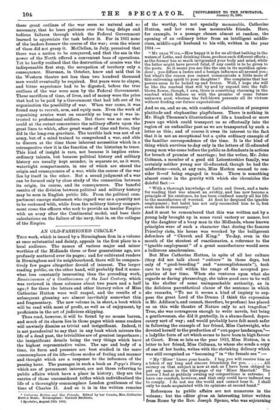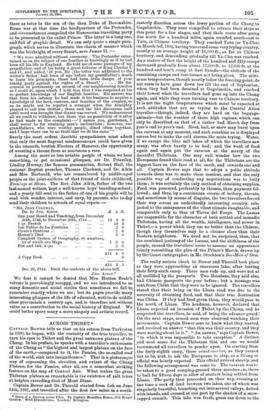AN OLD-FASHIONED CIRCLE.*
THIS work, which is issued by a Birmingham firm in a volume at once substantial and dainty, appeals in the first place to a local audience. The names of various major and minor worthies of the Midlands three or four generations ago, are profusely scattered over its pages; and for cultivated readers in Birmingham and its neighbourhood, there will be compara- tively few pages altogether devoid of interest. The larger reading public, on the other hand, will probably find it some- what less constantly interesting than the preceding work, Reminiscences of a Gentlewoman of the Last Century, which was reviewed in these columns about two years and a half ago rt. for there the letters and other literary relics of Miss Catherine Hutton were well reaped, and the results of a subsequent gleaning are almost inevitably somewhat thin and fragmentary. The new volume is, in short,-a book which will be read with most of profit, as well as of enjoyment, by proficienta in the art of judicious skipping.
Thus read, however, it will be found by no means barren, and much of its charm lies in those pages which some readers will unwisely dismiss as trivial and insignificant. Indeed, it is not paradoxical to say that in any book which mirrors the life of a dead past, the trivialities are of greatest importance ; the insignificant details being the very things which have the highest representative value. The age and body of a time, its form and pressure are best studied in the mere commonplaces of its life—those modes of feeling and manner and thought which are a response to the influences of the passing hour. The passages in such a book as Pepys's Diary which are of permanent interest, are not those referring to public affairs which have a place in history; they are the entries of those unconsidered trifles which individualised the life of a thoroughly commonplace London gentleman of the time of Charles II. And so it is in the written remains * Catherine Hatton and Her Friends. Edited by her Cousin, Mrs. Catherine Hatton Beale. Birmingham: Cornish Brothers.
t Spectator, August 13th 1892.
of the worthy, but not specially memorable, Catherine Hatton, and her even less memorable friends. Here, for example, is a passage chosen almost at random, the opening of an ordinary letter from an intelligent middle- class, middle-aged husband to his wife, written in the year 1804 :-
" My DEAR WIFE,—How happy it is for us all that bathing in the waters of Lathe, and drinking them, produce such different effects ; as the former has so much invigorated your body and mind, while the latter might have proved fatal, if any credit is to be given to the poets. So it seems you are like the sun in its meridian splen- dour ; you diffuse a lustre and a benign influence all around you ; but what's the reason you cannot communicate a little more of this enlivening spirit to your daughter ? She complains that her powers seem to be locked up and frozen. Well, I hope she will be like the rosebud that will by and by expand into the full- blown flower, though, I own, there is something charming in the rosebud which flatters us with the promise of some future unknown good, whereas the full-blown presents all its virtues without feeding our future expectations."
And so on, and so on, with continued elaboration of pompous platitude and elephantine playfulness. There is nothing in Mr. Hugh Thomson's illustrations of life a hundred or more years ago which could transport us so effectually into the region of an unfamiliar past as we are transported by such a letter as this ; and of course it owes its interest to the fact that it is not an exceptional but a quite ordinary example of the familiar correspondence of the time. It is the kind of thing which survives to-day only in the letters of ill-educated young men who come before the public as defendants in actions for breach of promise of marriage; but the writer, Mr. John Coltman, a member of a good old Leicestershire family, was certainly neither young nor ill-educated, though he had the misfortune—such, at any rate, Miss Hutton seemed to con- sider it—of being engaged in trade. There is something almost comic in the gravity with which she chronicles the doleful fact :-
" With a thorough knowledge of Latin and Greek, and a taste for reading that was almost an avidity, and has now become a principle of his existence, he has been confined nearly all his life to the manufacture of worsted. At first he despised the ignoble employment ; but habit has not only reconciled him to it, but even made it necessary."
And it must be remembered that this was written not by a young lady brought up in some rural rectory or manor, but by the daughter of a busy man in the Midlands, whose known principles were of such a character that during the famous Priestley riots, his house was wrecked by the belligerent defenders of "Church and King." To-day, even in the mouth of the stoutest of reactionaries, a reference to the " ignoble employment " of a great manufacturer would seem a ludicrous anachronism.
Bat Miss Catherine Hutton, in spite of all her culture (they did not talk about " culture " in those days, but only of " good-breeding " and " accomplishments"), took care to keep well within the range of the accepted pro- prieties of her time. When she ventures upon what she regards as daring phraseology, she takes good care to be well in the shelter of some unimpeachable authority, as in the delicious parenthetical clause of the sentence in which she remarks, "To me it seems a kind of impiety to sup- pose the great Lord of the Drama (I think the expression is Mr. Addison's, and cannot, therefore, be profane) has placed us on this wide theatre of Nature only to act tragedies." True, she was courageous enough to write novels, but being a gentlewoman, she did it genteelly, in a shame-faced, depre- catory sort of way ; and would probably have felt much safer in following the example of her friend, Miss Cartwright, who devoted herself to the production of " cut-paper landscapes,"— a ladylike form of art which seems to have been in high favour at Court. Even so late as the year 1813, Miss Hutton, in a letter to her friend, Miss Coltman, to whom she sends a copy of one of her books, writes with the shrinking delicacy which was still recognised as " becoming " in " the female sex " :—
" My ' Miser' kisses your hands. I beg you will receive him as a token of my long and sincere friendship for you All secrecy on that subject is now at end, as I have been obliged to put my name in the title-page of my Miser Married.' The horror I feel at publicly owning my compositions is extreme. I have one comfort, however, and that only could have induced me to comply. I do not see the world and cannot hear it. I shall only be made acquainted with its opinions at second hand."
References to public affairs are not numerous in the volume; but the editor gives an interesting letter written from Rome by the Rev. Joseph Spence, who was sojourning
there as tutor to the son of the then Duke of Devonshire. Rome was at that time the headquarters of the Pretender, and circumstances compelled the Hanoverian travelling party to be presented to the exiled Prince. The letter is a long one, and full of graphic detail. We can only quote a single para- graph, which serves to illustrate the charm of manner which was the birthright of every Stuart, save James IL :—
" We were admitted without ceremony. The Pretender enter- tained us on the subject of our families as knowingly as if he had been all his life in England. He told me of some passages of my grandfather, and of his being a great follower of King Charles I. and IL, and added, g If you, Sir [the letter was addressed to the writer's father] had been of age before my grandfather's death to learn his principles, there had been little danger of your taking party against the rights of a Stuart.' He dis- coursed as pertinently on several of our neighbouring families as I could do, upon which I told him that I was surprised at his so perfect knowledge of our English families. His answer was that from his infancy he had made it his business to acquire a knowledge of the laws, customs, and families of the country, so as he might not be reputed a stranger when the Almighty pleased to call him thither ; these and the like discourses held until word was brought that dinner was served. We endeavoured all we could to withdraw, but there was no possibility of it after he had made us the complaint :---` I assure you, gentlemen, I shall never be for straining men's inclinations ; however, our grandfathers, who were worthy people, dined often together, and I hope there can be no fault that we do the same.' "
Surely the most ardent Jacobite sympathisers must admit that only the most flagrant misdemeanours could have given to the uncouth, brutish Electors of Hanover, the opportunity of wresting a throne from so courteous a race.
Among the more or less notable people of whom we hear something, or get occasional glimpses, are Dr. Priestley, Lindley Murray, the famous grammarian, Robert Hall, the eminent Baptist preacher, Thomas Clarkson, and Dr. Aikin and Mrs. Barbauld, who are remembered by middle-aged
people as the joint-authors of that friend of their childhood, Evenings at Home. The Rev. John Aikin, father of the two last-named writers, kept a well-known boys' boarding-school; and a yearly bill sent to the father of one of his pupils will be read with wonder, interest, and envy, by parents who to-day send their children to schools of equal repute :— " Ma. JOHN COLTHAN, Du. to JNO. ALBIN.
One year Board and Teaching, from December
s. d.
20th, 1743, to December 20th, 1744 ... ... 12 0 0 1 qr. French
10 6 Lea Fables de La Fontaine ...
2 0 Cicero's Orations ...
1 6 Homer's Iliad ...
3 9 Compleat System of Geography, 40 numbers, 10 of which are Maps
Pen and Ink, 4 qrs
2 0
£14 4 9 A Copy Book
6
£14 5 3
Dec. 28,1844. Recd. the contents of the above bill.
JNO. ATKIN."
We fear it cannot be denied that Mrs. Hutton Beale's volume is provokingly scrappy, and we are introduced to so many domestic and social circles that sometimes we fail to remember exactly where we are; but its pages provide many interesting glimpses of the life of educated, well-to-do middle class provincials a century ago, and is therefore not without value as a contribution to the social history of England. We could better spare many a more shapely and artistic record.



















































 Previous page
Previous page